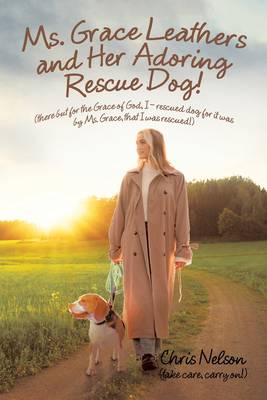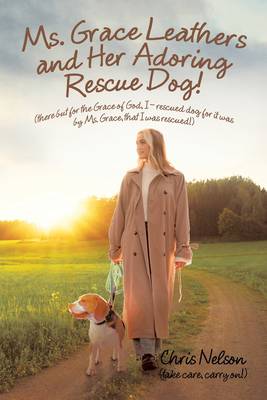
- Afhalen na 1 uur in een winkel met voorraad
- Gratis thuislevering in België vanaf € 30
- Ruim aanbod met 7 miljoen producten
- Afhalen na 1 uur in een winkel met voorraad
- Gratis thuislevering in België vanaf € 30
- Ruim aanbod met 7 miljoen producten
Zoeken
Ms. Grace Leathers and Her Rescue Dog
(There but for the Grace of God, I - Rescued Dog for It Was by Ms. Grace, That I Was Rescued!)
Chris Nelson
Paperback | Engels
€ 15,45
+ 30 punten
Omschrijving
A universal need of all warm blooded mammals is: to love and be loved (in return). Paradoxically, in our modern, fast paced, society, it is a need which often goes unfulfilled. This is attested to/evinced by data on percentages of the population living alone and unattached: 50% alone, in Canada, where I live in a retirement community. Before industrial society came into being, in days of feudalism, the problem situation facing humanity was characterized/portrayed as being one of battles between rival lords of manors, vying for supremacy, and the exploits of knight errant employed in their service. The best simile/metaphor for this type of fighting in feudal society, was seen to be that of an "obstacle course", where knight errantry often involved knights in white armor taking on first, one opposing knight in black armor, and then another, and then another in a jousting match on a field of battle. Thus the obstacle course analogy: successful knights would overcome all obstacles, i.e. all rival knights in the way of a victory for their lord of the manor. Each knight would be identified by distinctive insignia/coat of arms that was unique to his lord, that way each knight could tell friends from foes. This was an exciting but dangerous life, and knights were the heroes of the story, as in the Legend of King Arthur and the Knights of the Round Table, or in John Bunyan's Christian book, Pilgrim's Progress. Contrast this with the metaphor for life and living, under modern industrial society, where there is a widespread feeling of isolation even in the midst of many. What is the reason for this feeling of isolation and alienation? Could it be that it stems from the nature of work or the workplace (interacting alone with a computer screen) - or the rules and laws governing interpersonal relations of people living in communities (a don't touch me society)? - or, sometimes, over-reliance on "passive" forms of entertainment which connects people to the medium, but disconnects people from each other? Is there any metaphor for the new problem situation facing people in our modern, industrial society, namely: alone and lonely? You may have heard of the story of the famous shipwrecked sailor, Robinson Crusoe (book by Daniel Defoe), marooned all by himself, on an uncharted desert island? Who made the best of his situation by building things to satisfy all his physical economic needs? Much like we have built an economy that satisfies all our physical needs. Crusoe, did not stop there, he went on to satisfy his spiritual needs, by noting all the marvels of nature, and narrow escapes from storms, that made him believe that providence was on his side, converting him to Christianity. Then, providence did him another good turn. A cannibal, by the name of Man Friday, was fortuitously left on the island, by an accident of fate, and Robinson, now had a companion, whom he educated into Christianity from his heathen/uncivilized ways. The functional role that Man Friday fulfilled for Robinson - his best friend - in many ways bears a resemblance to the the "role" of pets - especially that most loyal of pets, the dog - play as friends for people, in isolated modern society. If Man Friday was Robinson Crusoe's loyal best friend, then could we not with justification, say, that for people, esp. isolated ones, dogs likewise serve as man's best friends and loyal companions? Thus our need to love and be loved, even when we are denied "the real thing" - a person to call our own - has a way of "going underground" and finding the next best substitute for the real thing - which oftener than not - turns out to be a beloved pet (s). Dog may not be quite as desirable as a human partner, but given that so many people have no human partners, dog has, in effect, become: man's best friend! It is to be hoped that we humans reciprocate by also being: dog's best friend! Knowing that genuine love is always a two-way street!
Specificaties
Betrokkenen
- Auteur(s):
- Uitgeverij:
Inhoud
- Aantal bladzijden:
- 56
- Taal:
- Engels
Eigenschappen
- Productcode (EAN):
- 9781669835547
- Verschijningsdatum:
- 15/07/2022
- Uitvoering:
- Paperback
- Formaat:
- Trade paperback (VS)
- Afmetingen:
- 152 mm x 229 mm
- Gewicht:
- 95 g

Alleen bij Standaard Boekhandel
+ 30 punten op je klantenkaart van Standaard Boekhandel
Beoordelingen
We publiceren alleen reviews die voldoen aan de voorwaarden voor reviews. Bekijk onze voorwaarden voor reviews.











